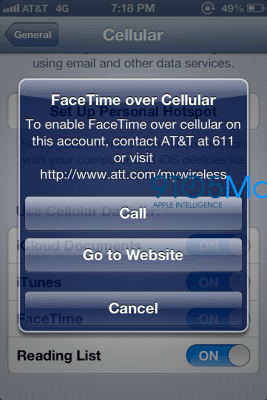AT&T ruffled more than a few feathers last week when it announced that only customers on the carrier’s new Mobile Share plans would be able to use iOS 6’s FaceTime over 3G feature. Almost immediately, people began to wonder whether or not this course of action put AT&T at odds with the FCC’s stance on net neutrality.
The company waited until today to issue an official response — AT&T SVP Bob Quinn just recently took to the company’s Public Policy blog to explain how the decision doesn’t violate FCC rules, but not without jabbing that those who questioned it in the first place.
“…In another knee jerk reaction, some groups have rushed to judgment and claimed that AT&T’s plans will violate the FCC’s net neutrality rules. Those arguments are wrong.”
How so, Bob? First, I should note that he’s clearly referring to a statement released on Friday by John Bergmayer, a senior staff attorney with Public Knowledge. According to Bergmayer, AT&T’s plan violates the FCC’s Open Internet rules, specifically one that bars carriers from blocking “applications that compete with the provider’s voice or video telephony services.” Quinn doesn’t quite see it that way, and argues in his post that the provision is meant to keep providers from preventing the downloading of those apps. Since FaceTime is built directly into iOS 6, he seems to feel that it doesn’t fall under those particular guidelines.
Quinn also mentions that since AT&T plans to be fully transparent about “the network management practices, performance, and commercial terms of their broadband Internet access services,” so there’s apparently no net neutrality violation on that front either.
Later on in the post, Quinn touches on something that has been pretty obvious to everyone watching these events unfold. He notes AT&T is limiting use of the FaceTime over 3G feature out of “overriding concern for the impact this expansion may have on our network and the overall customer experience.” It’s a sad truth that AT&T’s data service can get pretty sketchy in certain high-traffic areas, and it’s little surprise that AT&T would want to try and mitigate the strain that incessant video calls could place on its network. Still, as Chris Ziegler at the Verge points out, that’s exactly why the carrier introduced tiered data plans in the first place — seems like a pretty flimsy argument to make at this point.
